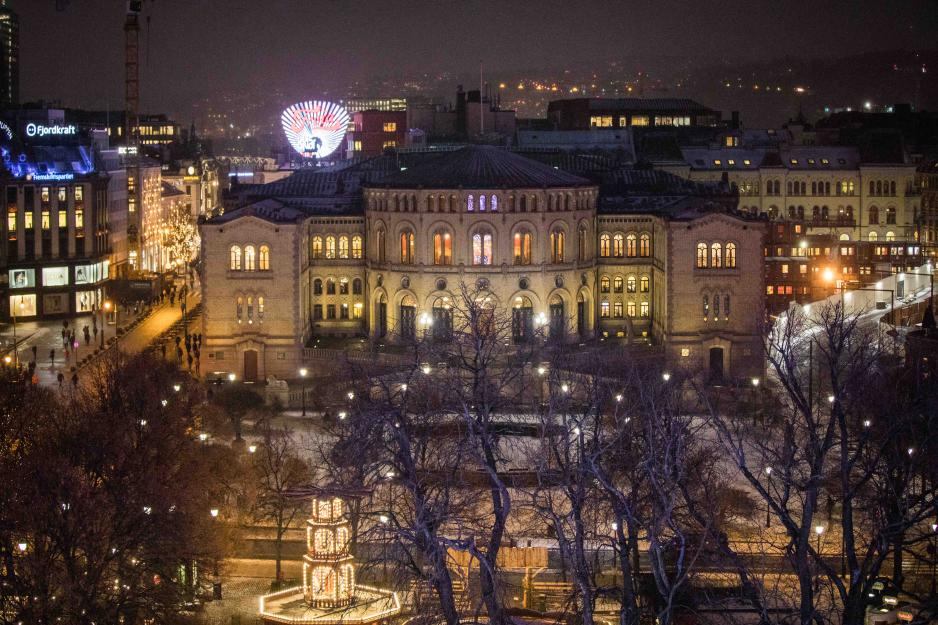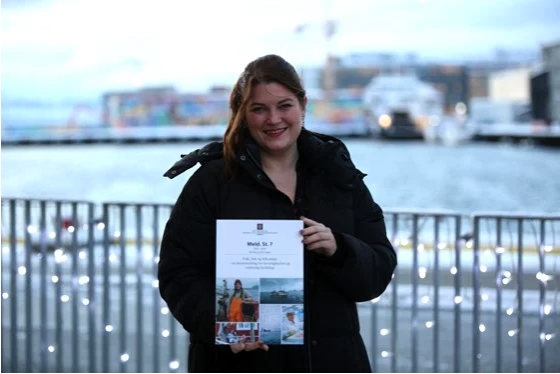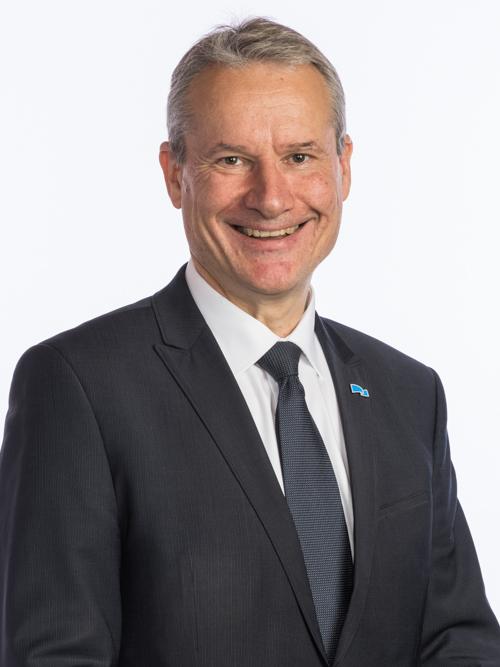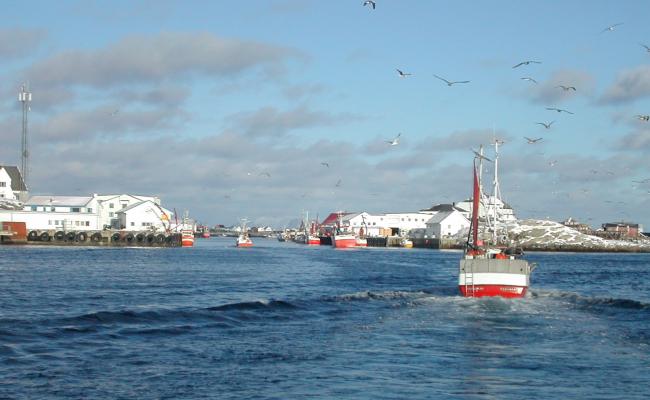The Norwegian Government Agrees With Opposing Parties On New Fisheries Policy

The parties that agreed on the quota whitepaper on Friday have considered a broad political basis important during the parliament's processing to create predictability for one of the country's most important industries. (Photo: the Storting)
The Norwegian government parties have agreed with the opposing parties on the quota white paper. "The Labor and Center Party are throwing away a historic opportunity to bring the fish back to the people and create workplaces in coastal fisheries and fish processing in the land industry," says Red Party fishery policy spokesperson Geir Jørgensen.
Last week, the government parties in Norway agreed with the Conservative, Progress, Liberal, and Christian Democrat Party on the whitepaper about the fisheries’ quota system.
The Minister of Trade, Industry, and Fisheries, Cecilie Myrseth (Labor), presented the quota whitepaper in January, titled "People, fish, and community—a quota whitepaper for predictability and fair distribution." The whitepaper sets the premises for how fisheries will be conducted in the years to come.
At the presentation, Myrseth announced that the whitepaper contained several changes but that it would not be a revolution – and emphasized the importance of broad agreement on the fisheries industry's main pillars.
"The government's objective for the fisheries industry is clear: We wish to ensure a fairer distribution, to ensure activity and settlement in local communities along the entire coast," said Myrseth.

The Minister of Trade, Industry, and Fisheries, Cecilie Myrseth, with the new quota whitepaper. (Photo: the Ministry of Trade, Industry and Fisheries)
Red and Socialist Left reacts
"The government is letting the coast down, and the Labor and Center Party are wasting a historic opportunity to bring the fish back to the people and create workplaces in coastal fisheries and fish processing in the industry on land," said the Red Party's fishery policy spokesperson, Geir Jørgensen, to High North News about the agreement.
Jørgensen believes the agreement does not address the Office of the Auditor General of Norway (OAG)'s criticism of the fisheries policy, nor does it create more activity on fish plants or at sea in the Northern Norwegian fishing villages.
At the cost of coastal communities
"Today, the richest shipowners and largest quota barons can be pleased with an almost full breakthrough in protecting their incomes at the cost of the coastal communities. It should be difficult for a new fisheries minister from Northern Norway to administrate the right's fisheries policy in the coming years," says Jørgensen
"The Red Party has been constructive in the negotiations, and the government had all opportunities to receive good help to fulfill their promises of re-distribution and ensure settlement, employment, and value creation along the coast. It is incredibly disappointing that the government has shut the door on us and is actively seeking a majority with the right rather than following up the signals from their own voters in the parliament election," he emphasizes.
The Socialist Left Deputy Parliamentary Leader, Torgeir Knag Fylkesnes, also reacted to the agreement with the conservative parties. The Socialist Left was part of the negotiations until Thursday, wrote Fiskeribladet. Fylkesnes told the newspaper that the distance was enormous.
A broad majority
The Norwegian fishing industry is one of Norway's most important industries, and Norwegian fisheries policy has been characterized by a large political consensus across the blocs for many years. Most of the parliament parties agree with the government's quota white paper and have decided on cross-party changes.
From the agreement that the Labor Party, the Conservative Party, the Center Party, the Progress Party, the Liberal Party, and Christian Democrats signed regarding the quota whitepaper on Friday.
Different concerns and predictability
"I am pleased we have reached a broad consensus regarding fish distribution. For the Centre Party, it means that we are securing a viable coast with opportunities, but we have also had to prioritize between various concerns. We have clarified necessary matters that have plagued the fisheries industry. I want to praise the parties for the will to land an agreement in this matter," says rapporteur Willfred Nordlund of the Centre Party in a press release.
The parties that agreed on the quota white paper considered a broad political foundation important during the parliament's processing to create predictability for one of the country's most important industries.
"The Conservative Party is pleased with a broad majority for the quota white paper while also getting approval for matters important to us. When it comes to changing the quota distribution, we have arrived at a scheme that acceptably compensates for this. The quota white paper will contribute to the long lines and stability for the fisheries policy," the Conservative Party's Olve Grotle adds.
Major debate around new distribution of cod
As High North News has previously reported, the government clarified four central aspects at the presentation of the quota whitepaper. These included the issue of redistribution of structural quotas and how this will occur in the industry.
Another important aspect was the distribution of cod quotas. The quota white paper reveals that the government wants to reintroduce the "trawl ladder", which the Solberg cabinet replaced in the previous quota white paper in 2020.
The trawl ladder entails a dynamic quota distribution. In other words, a larger share of the quotas will be allocated to the coastal fleet when the total quota is low and a larger share to the ocean fleet when the total quota is high.
The quota distribution of cod to the open group has also been hotly debated.
The Labor and Centre Party proposed that the open group's (no need for concession to participate in the fisheries) quota for cod north of 62 degrees north should be a 6,12 percent allocation from "the top," i.e., the total Norwegian cod quota.
Previously, this quota has been taken from the quota distributed to the vessel groups with conventional tools. That the open group's quota is taken from the top involves a new distribution in which the trawl fleet will have to give up cod to the open group.
The matter will be processed in parliament on April 29th.
The Labor, Liberal, Christian Democrat, and Progress Party about the quota agreement
"For the Labor Party, it has been important to create a fairer distribution of our valuable fish resources and create the foundation for more diversity in the fishing fleet. Not least, it is important to ensure activity in the industry on land. With this settlement, we can secure more workplaces, more activity, and more settlement along the entirety of Norway's long coastline," says the Labor Party's fisheries policy spokesperson, Runar Sjåstad.
"For the Progress Party, it has been essential to try to land a political majority as broad as possible for the quota white paper so that it can last and create predictability for the fisheries industry. The industry has been very significant to the Norwegian economy, settlement, and employment along the coast," says the Progress Party's Bengt Rune Strifeldt.
"For the Liberal Party, listening to the fisheries industry has been important, which creates major value for Norway out at sea. We are very pleased with having reached broad consensus, creating predictability and security for investments and the green shift in all parts of the industry," says the Liberal Party's business policy spokesperson Alfred Bjørlo.
"The Christian Democrats are pleased with the quota white paper agreement in parliament. It has been important to us to contribute to a broad consensus that can last over time. Fisheries is an important industry to Norway, and it deserves predictability on basic conditions," says Ida Lindtveit Røse, Deputy Parliamentary Leader of the Christian Democrats.





